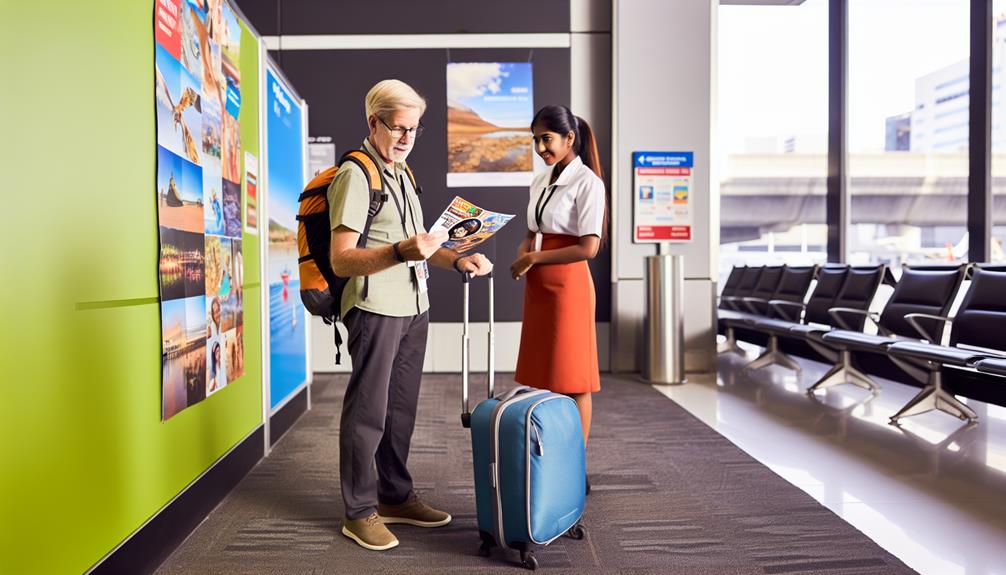To get journey insurance as a solo traveler, start by evaluating your needs. Look for plans with at least $250,000 in emergency medical coverage and consider options like trip cancellation and baggage protection. Compare multiple providers to find the best coverage for your budget. Be sure to purchase your insurance soon after booking, as this can protect your investment and cover pre-existing conditions. Don't forget to check policy details for limits and exclusions. Each traveler's needs are unique, so exploring further can help you make the best choice for your solo adventures.
Key Takeaways
- Evaluate your trip duration and ensure you select a policy that offers comprehensive coverage for the entire journey.
- Aim for at least $250,000 in emergency medical coverage, including medical evacuation and repatriation.
- Compare multiple providers and plans to find the best coverage options and costs tailored for solo travelers.
- Purchase travel insurance immediately after booking to secure cancellation protection and cover pre-existing conditions.
- Read the policy details carefully, focusing on exclusions, limits, and requirements for claims to avoid surprises.
Importance of Travel Insurance
When you're traveling solo, having travel insurance can feel like a safety net you didn't know you needed. It protects you against unexpected events like trip cancellations, medical emergencies, and lost baggage, providing essential financial security. As a solo traveler, all financial risks fall on your shoulders, making it imperative to invest in travel insurance to avoid hefty out-of-pocket expenses from unforeseen circumstances.
Understanding the specific terms of your travel insurance policy is essential. You'll want to know how it handles lost items during activities, which can be especially important for solo travelers. With the right coverage, you can navigate unfamiliar environments with greater confidence, knowing you have access to emergency assistance should you need it.
The financial protection provided by travel insurance greatly reduces stress, allowing you to focus on enjoying your adventures instead of worrying about potential mishaps. Whether it's an unexpected flight cancellation or a medical emergency, having travel insurance guarantees you're not alone in facing these challenges. So before you set out on your journey, consider how travel insurance can enhance your experience and peace of mind as a solo traveler.
Coverage Options Available
Choosing the right travel insurance coverage is essential for solo travelers, as it can greatly impact your overall experience. When exploring coverage options, you'll want to take into account several key aspects of your travel insurance policy to guarantee you're well protected.
- Emergency Medical Coverage: This is critical for solo travelers. Look for policies that provide at least $250,000 in medical emergency expenses, as unexpected health issues can arise at any time.
- Trip Cancellation/Interruption: Financial reimbursement for unexpected changes in plans is essential. This coverage can save you from losing money due to unforeseen circumstances.
- Baggage Coverage: Protecting your personal belongings is significant, especially if you're traveling alone. Make sure your policy covers lost or delayed luggage to minimize inconvenience.
Additionally, extensive policies typically offer higher benefit limits and extra protections, making them ideal for longer or higher-value trips. Don't forget to review the specific limitations related to activities and personal belongings. Understanding these coverage options will help you choose a travel insurance policy that meets your needs and allows for a stress-free adventure.
Choosing the Right Plan

Selecting the right travel insurance plan involves careful consideration of your trip's details and your unique needs as a solo traveler. Begin by evaluating the duration of your journey; make certain to choose a policy that covers the entire period, particularly for longer trips. As you review different travel insurance plans, pay close attention to the medical coverage limits. Aim for at least $250,000 in emergency medical expenses to guarantee you're well protected while abroad.
Next, think about any optional add-ons you might need. Coverage for adventure sports or a "Cancel For Any Reason" option can be vital if you plan to engage in high-risk activities or want greater flexibility. Don't forget to compare multiple insurance providers to find the best combination of coverage and cost. Typically, travel insurance will range from 5% to 10% of your total trip expenses, so shop around for the best deal.
Multi-Destination Insurance Needs
For many solo travelers, multi-destination trips can be an exciting adventure, but they also come with unique insurance needs. To guarantee you're fully protected, consider these key points when selecting multi-destination insurance:
- Comprehensive Coverage: Look for policies that provide consistent protection across all countries you plan to visit. This can simplify the insurance process and keep you covered, regardless of your itinerary changes.
- Destination Verification: Not all insurance providers cover every country. Before purchasing, double-check that all your intended destinations are included in the policy to avoid unexpected gaps in coverage.
- Early Purchase Benefits: Securing your multi-destination insurance early can yield significant advantages, like pre-existing condition waivers and protection against cancellations due to unforeseen events. This can be particularly valuable if you're at risk for medical expenses during your travels.
Considerations for Senior Travelers

Many senior travelers face unique challenges when it comes to travel insurance, making it essential to understand the specific options available. Consider purchasing a Deluxe Plan, as it typically offers higher benefit limits and tailored coverage to meet your unique needs. Early purchase of travel insurance is vital for securing coverage for pre-existing conditions, especially if you have ongoing health issues.
Be aware of coverage limitations specific to senior travelers. Some policies may impose restrictions or higher premiums based on your age, so it's important to read the fine print. Additionally, evaluate any extra assistance features available, such as concierge services or 24/7 medical assistance. These can provide vital support during your trips, ensuring you feel safe and well cared for.
Before selecting a travel insurance plan, take some time to review your existing health insurance and credit card benefits. This can help you identify any gaps in coverage and make informed decisions. By understanding these considerations, you can select a travel insurance plan that best meets your needs, allowing you to travel with confidence.
Key Tips for Insurance Selection
When it comes to choosing travel insurance, diving into the details can make all the difference. By taking the time to evaluate your options, you'll find an insurance plan that fits your needs and provides peace of mind for your journey.
Here are three key tips to help you select the right travel insurance:
- Compare Multiple Providers: Don't settle for the first policy you find. Look at various insurance plans to evaluate coverage options and costs. This guarantees you get the best deal tailored to your specific travel needs.
- Read the Fine Print: Carefully review the policy details, focusing on coverage limits, exclusions, and requirements for filing claims. Pay special attention to pre-existing medical conditions, as many policies have specific rules regarding them.
- Purchase Early: It's wise to buy insurance as soon as you book your trip. Many policies require timely enrollment to offer full benefits, especially for trip cancellations.
Essential Medical Coverage Details

Steering through the complexities of travel can be stressful, but securing essential medical coverage offers peace of mind. When selecting a travel insurance plan, it's vital to guarantee that it includes thorough emergency medical coverage. Aim for at least $250,000 in coverage to manage potential healthcare costs abroad effectively.
Consider these key components when reviewing your policy:
| Coverage Type | Importance | Recommended Minimum |
|---|---|---|
| Emergency Medical Expenses | To cover hospitalization and treatment | $250,000 |
| Emergency Medical Evacuation | To transport you to appropriate facilities | Included in the plan |
| Repatriation of Remains | To return a deceased traveler home | Included in the plan |
Additionally, make certain your plan covers hospitalization expenses, including room and nursing services, and any necessary medical treatment during your trip. Don't forget about emergency dental treatment, as dental issues can arise unexpectedly while traveling. By confirming these details are included in your travel insurance plan, you'll be better prepared for any medical emergencies that may occur during your solo journey.
Understanding Limitations and Exclusions
Understanding the limitations and exclusions of your travel insurance policy is just as important as obtaining medical coverage. You don't want to find yourself in a bind when you need it most. Here are three key areas to focus on:
- Pre-existing Conditions: Many policies include exclusions related to health issues that existed before you purchased the insurance. Be sure to disclose any pre-existing conditions, as failing to do so can lead to claim denials.
- Coverage for High-Value Items: There are often limitations on coverage for personal items. If you're traveling with expensive electronics or jewelry, check the specific limits to guarantee you're adequately protected.
- Trip Cancellations: Not all policies cover trip cancellations due to events like pandemics or government travel advisories. Always read the fine print to know what's included and what isn't.
In addition to these points, remember that timely reporting of any theft or damage—usually within 24-48 hours—is vital. Delays can result in claim denials or reduced compensation, leaving you vulnerable when you need support the most.
Expert Recommendations and Resources

Before you finalize your travel plans, it's vital to gather expert recommendations and resources to secure the best journey insurance for your solo adventures. Start by researching reputable travel insurance providers like True Traveller, Safety Wing, and World Nomads. These companies offer tailored policies specifically for solo travelers and various adventure activities.
Utilizing comparison websites such as InsureMyTrip.com can help you evaluate different insurance options, pricing, and coverage specifics before you purchase travel insurance. This will guarantee you find a plan that meets your needs. Remember, it's important to buy your insurance immediately after booking your trip to cover any potential cancellations or interruptions.
Additionally, check for existing travel insurance benefits through your credit cards or health plans. This could save you from unnecessary duplicate coverage. To make an informed decision, read reviews and seek recommendations from fellow travelers on forums like FlyerTalk. Their insights can guide you to a provider that aligns with your specific travel needs and preferences, making it easier to find the right insurance for solo travelers.
Frequently Asked Questions
Does Family Travel Insurance Cover Individuals Travelling Alone?
Family travel insurance can cover individuals traveling alone, but you need to check the specifics with your insurance provider. If you're included on the policy, you should be covered, even if you're flying solo. Just make sure to read the fine print for any limitations or exclusions related to solo travel. If you're planning an extended trip, consider getting a dedicated travel insurance plan that suits your individual needs better.
Can I Buy Trip Insurance on My Own?
Yes, you can definitely buy trip insurance on your own! Many online providers let you compare policies and customize coverage to fit your travel needs. Just visit their user-friendly websites to get quotes tailored to your trip duration and planned activities. Make certain you read the fine print to understand coverage limits and exclusions. This way, you'll guarantee you've got the right protection right from the moment you book your trip.
Can You Get Travel Insurance Separately?
Yes, you can get travel insurance separately from your trip bookings. This option lets you tailor your coverage to fit your specific needs. Many providers offer standalone plans that cover medical emergencies, trip cancellations, and lost belongings. It's smart to compare different options to find the best coverage and prices for your travel plans. Just be sure to read the fine print to understand any limits or exclusions in your policy.
What Is Single Trip Travel Insurance?
Single trip travel insurance covers you for one specific journey, protecting against risks like trip cancellations, lost luggage, and medical emergencies. It usually costs about 5% to 10% of your total trip expenses, making it a budget-friendly option for occasional travelers. You can tailor coverage options, including emergency medical expenses and personal liability, to fit your needs. It's smart to buy this insurance right after you book your trip for maximum benefits.
